Shortly after setting off I reached a village. I rode through it then realised I was supposed to have taken a turning. I had to backtrack a couple kilometres uphill.
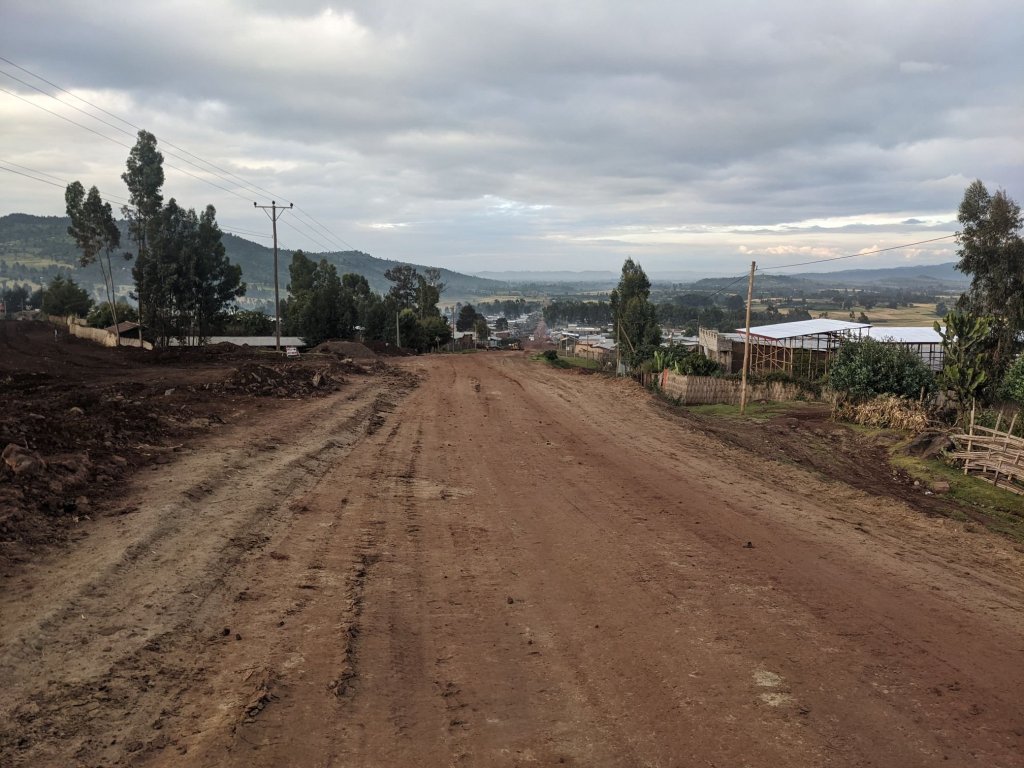
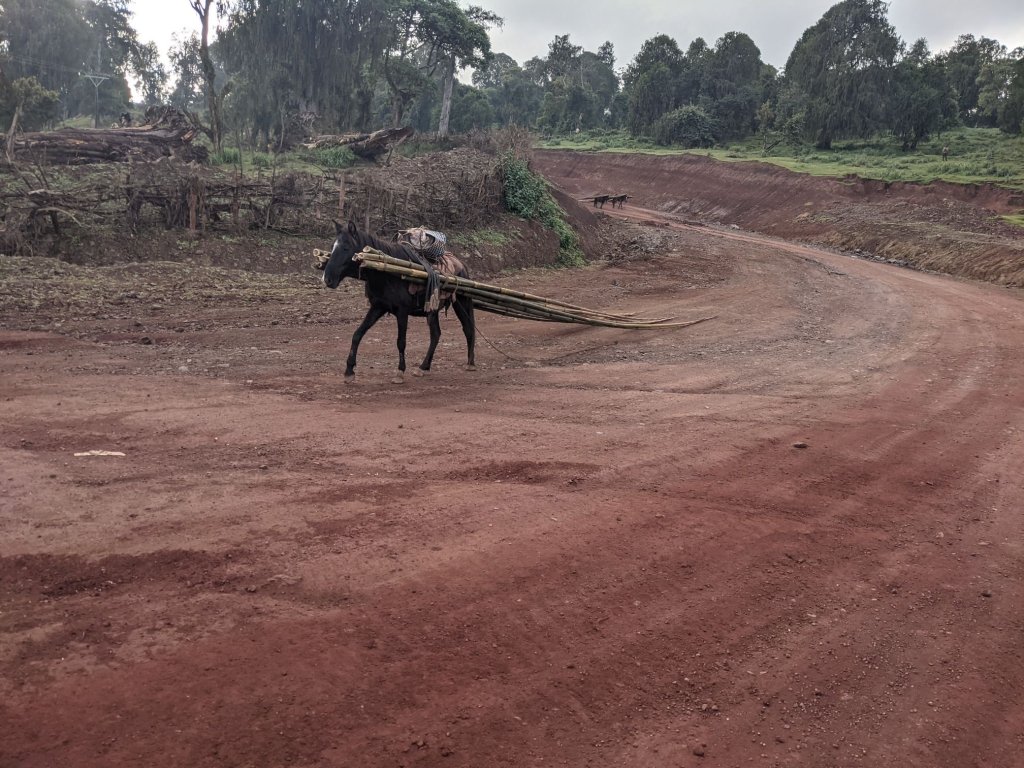
I continued to ride uphill for most of the day. The people in this area seemed to be mostly Muslim – women wore headscarves and I passed the occasional very basic mosque.
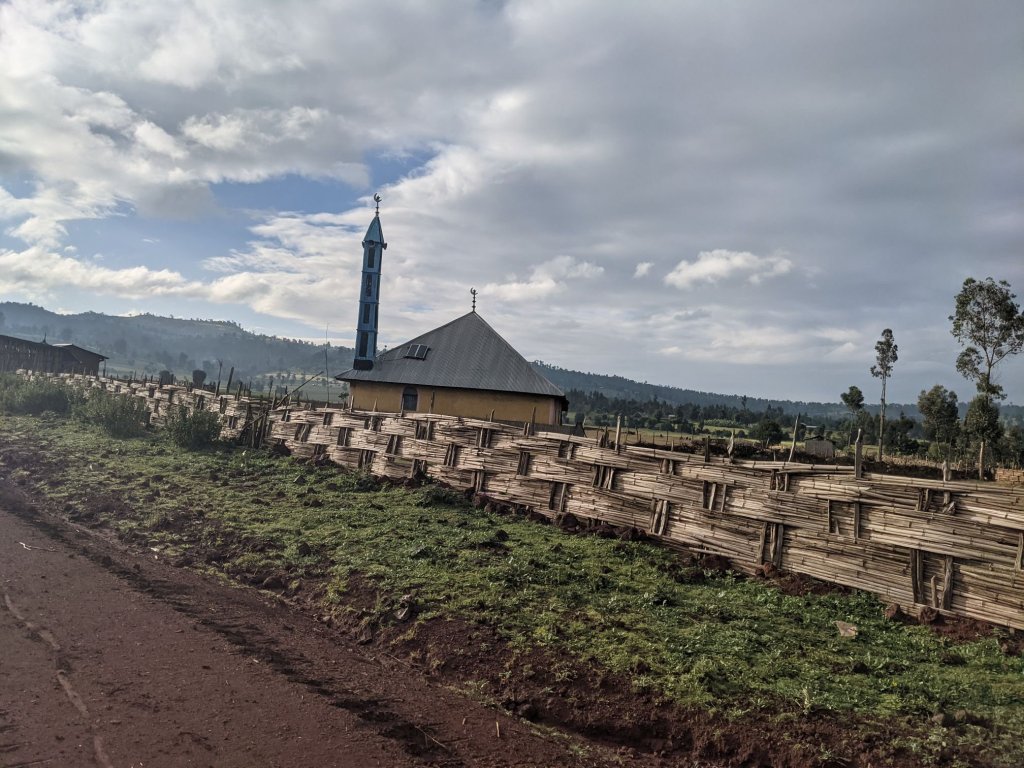
I stopped to collect water from a river, and during the minute I was stopped I acquired a crowd. There was an uphill section after, and I had several motorbikes beside me and people running behind me.
Once they’d given up, I stopped to filter the water. I sat down behind a fence which, although it wouldn’t completely hide me, would at least make it less likely for people to see me. I was able to take a break without anyone staring at me, which was nice.
My rear tyre went flat and I stopped to replace the tube. Of course people stopped to watch but they did at least keep a reasonable distance away. Slightly unusually there were two women, recording me on a smartphone.

The road topped out at about 3100m. The views from up there were impressive.
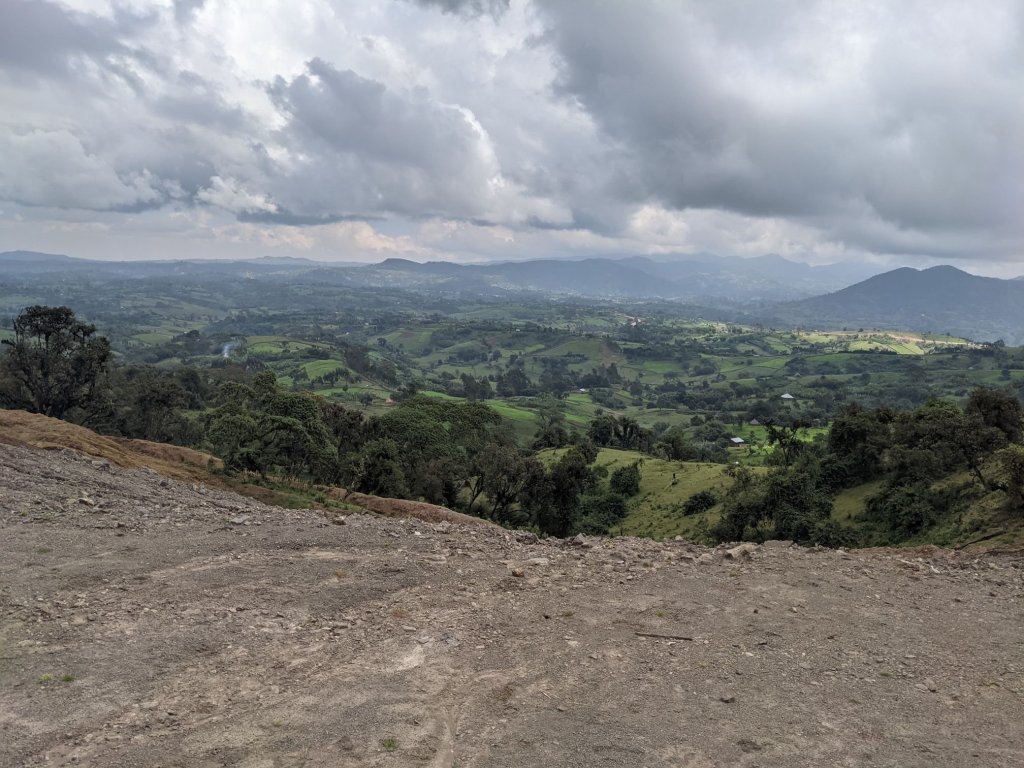

I turned off onto a smaller dirt road. After a few ups and downs a longer descent began, though the road was rough enough that I wasn’t going much faster then when I was going uphill.
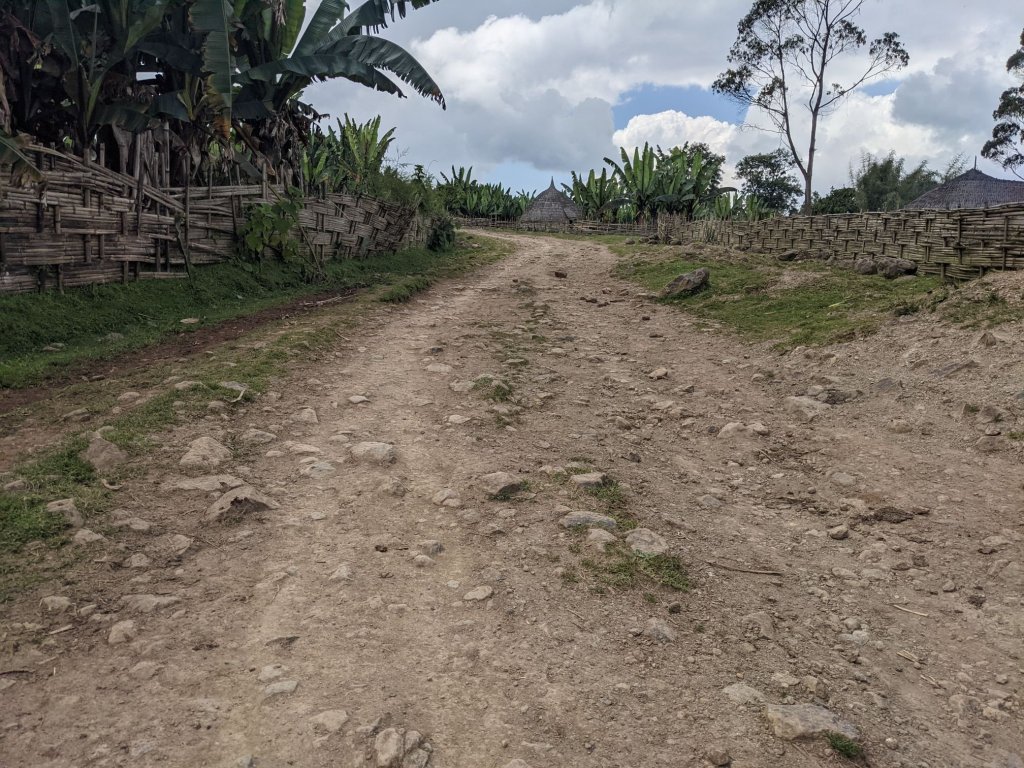
Whenever I was going slowly here, groups of kids followed me. There was practically a relay – by the time one group of kids got tired, I had reached a new group and they would take over the chase.
As I rode into a village, two men armed with rifles gestured for me to stop. They didn’t have any uniform, but were dressed slightly better than the rest of the villagers. They started asking where I was from, and why I was here. Soon a third armed man showed up, not to mention the gathering crowd of villagers. None of them could get their heads around the concept of tourism, or visiting somewhere. As far as they were concerned, the only reason for going somewhere was to work, or for some nefarious purpose.
They wanted to see my passport, so I showed it to them. Everyone in the village had started running over when I was stopped and I was surrounded by probably 200 people. The armed men tried to shoo away the crowds, but it had as much effect as when I tried to get rid of Ethiopians following me – zero.
Finally a fourth gunman arrived, on a motorcycle. He was handed my passport, and asked where I was going. I told him Dilla – a decent size town I’d found on the map. He told me to go, clearly wanting me out of his village. This was a desire I shared so I rode off immediately.
The third and fourth gunmen later passed me on the motorcycle, then stopped due to the road being flooded. They knocked down a fence and went through a field, gesturing for me to do the same. They repeated some of their earlier questions but didn’t seem to mind when the answers were the same. I was relieved when they rode off.
A few kilometres later I was stopped again, this time by several Federal policemen. They seemed to just be hanging out in a field but presumably they had an outpost nearby. They had similar questions. My “cover story” is that I’m Irish, since that’s the passport I’m using, and that I’m a teacher in Ireland (since they don’t understand the idea of not working). They still couldn’t get their heads around tourism but one finally asked “Discover Ethiopia?” I went along with that and they let me go.
The people in this area seemed very suspicious of outsiders. Most of the men and lots of the boys carried spears – something I don’t think I’ve seen before. Instead of the usual shouts and shrieks, I was greeted with stony silence and suspicious glares. They were Christian – women wore their hair uncovered and many men bore crosses on necklaces.
Passing through another village, several motorbikes gathered around and eventually made me stop. They didn’t seem to be anything official, but asked the same questions and searched some of my bags. Eventually they too let me continue on.
The fourth stop came from another man on a motorcycle, this one well dressed which seemed to suggest he might be some sort of local official. The same questions were asked, and he didn’t seem to have any idea what to do. A crowd gathered, as usual. I just kept asking every couple minutes if I could continue to Dilla and after a while he let me go.
It was almost a relief when I reached an area where the annoying yells of Ferengi returned – better that than the suspicion. I was able to ride on to a town, Daye. It was only mid-afternoon, but I wouldn’t reach any other town with a hotel today, and the population density would make camping difficult. I searched for a hotel, followed by crowds of people wherever I went. I tried asking them about a hotel but they had no interest in helping.
At last I found somewhere. It was one of the worst hotels I’ve stayed in. A concrete cell with a wooden window and door, both full of holes. The only lock was a very flimsy bolt. There was a lightbulb and switch but they did not work. There was a shared pit toilet; no running water. A remarkable number of people were crowded around. It wasn’t really clear who was in charge but several men negotiated the price. I got them down from 500 to 250 Birr (£4) which was overpriced for what it was, but I wanted somewhere to stay. After I paid another of the men demanded more money, but I refused and he went away.
Some police showed up after a few minutes to search my room. They looked under and behind the bed, then looked through some of the bags on my bike, to the point of taking my tent out of its bag and unrolling it. After a while they were satisfied and left. A thunderstorm started soon after, so I was glad I’d stopped early.

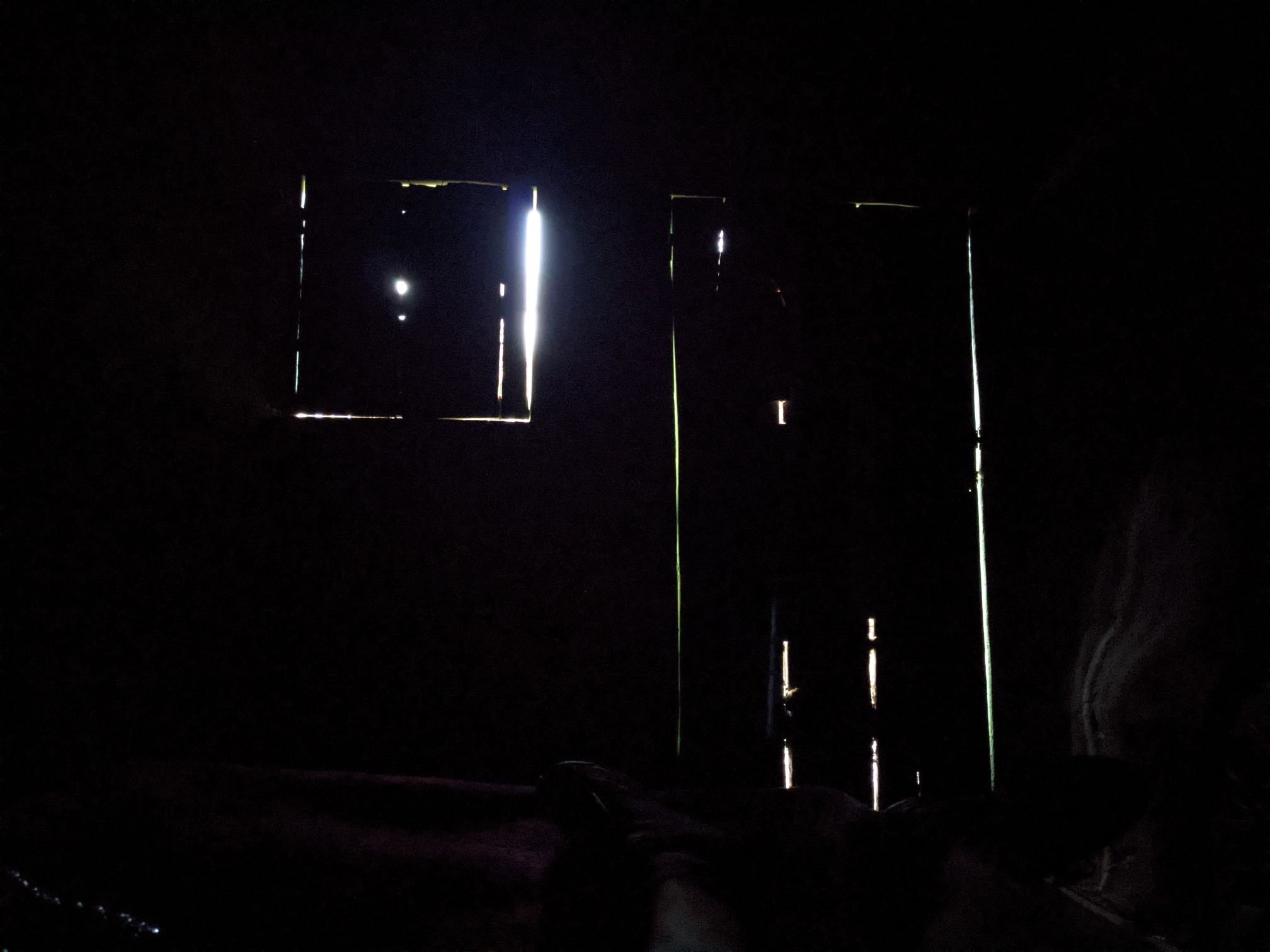
Before all this hassle, I had been considering making my way to the main road, just so that I would get out of Ethiopia faster. I hadn’t decided – the main road would be faster, but the dirt road more scenic and interesting. After this day, it was an easy choice to make my way back to the main road.
I set off at dawn the next morning. The road through the town was tarmac, but I expected it to revert to dirt once I got back to the countryside. It was a pleasant surprise to find that the tarmac continued, and I decided to take a slightly longer route that would mean staying on the paved road.
This is a mountainous region, and the day involved a great deal of climbing and descending, ending with about 30km for a long descent to the town of Dilla, on the main highway.
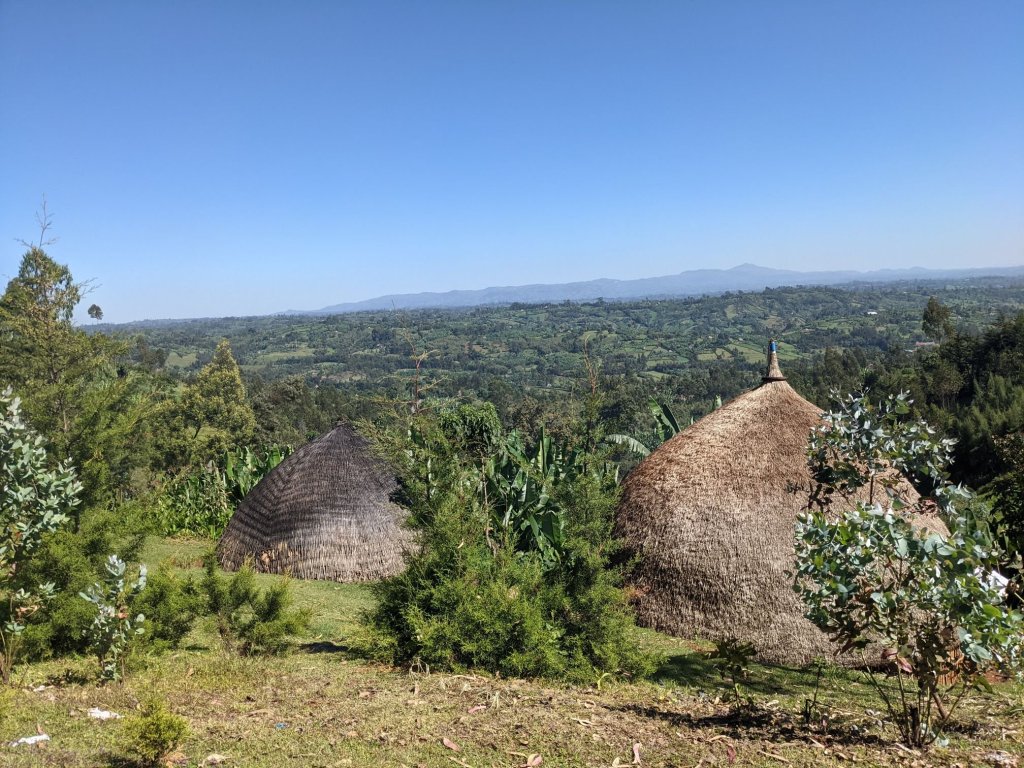

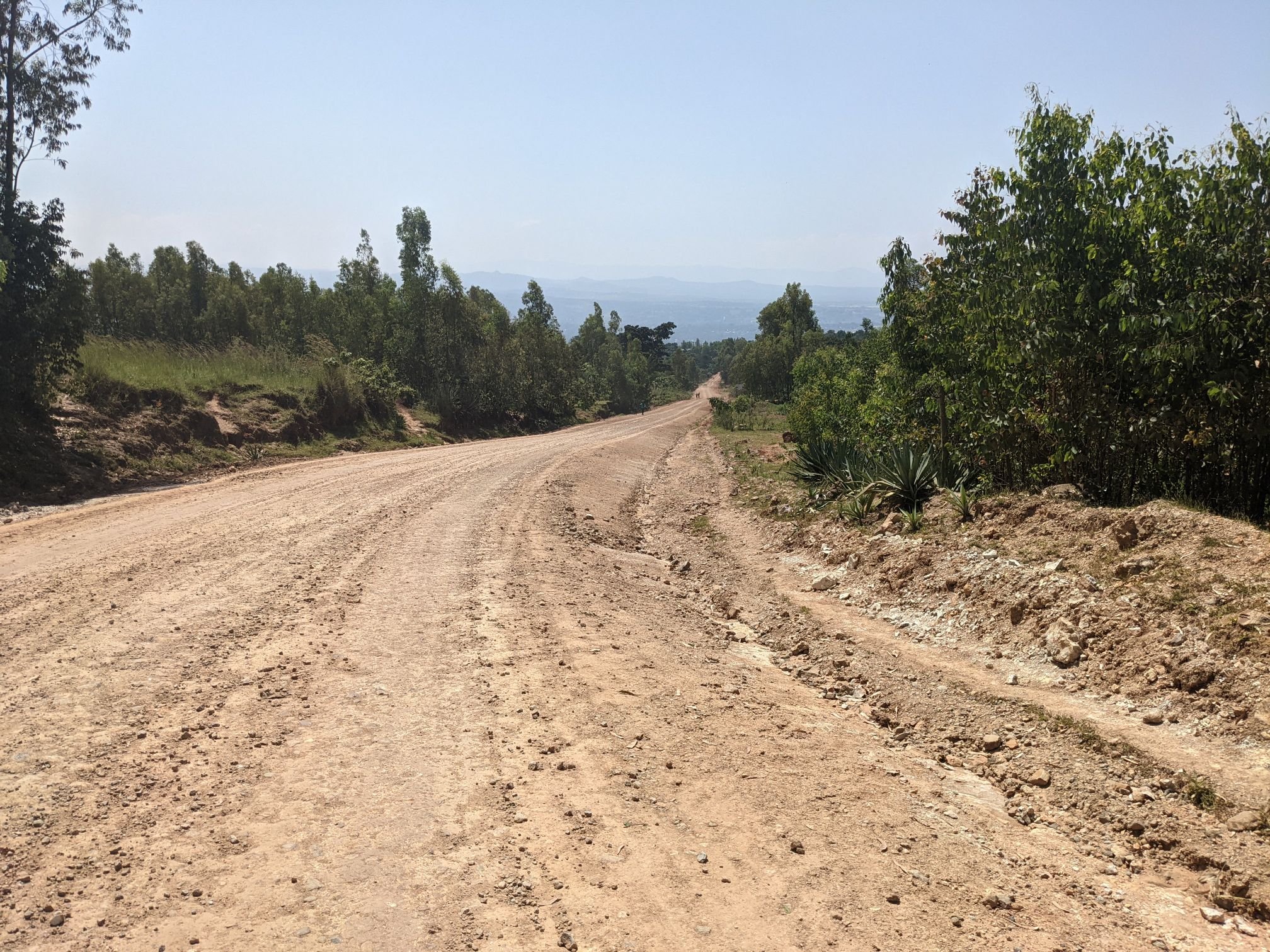
The people mostly seemed back to their usual selves – yelling at me, chasing me, trying to stop me – but now it was just for the fun of abusing a foreigner, or to beg for money. That’s an improvement on threatening. I still felt on edge though.
The government has recently been losing ground in the civil war in the north. The PM has instructed citizens to take up arms to defend their neighbourhoods. That may be related to the amount of trouble I had yesterday. Although luckily none of those had turned hostile, they did feel as if they easily could have. Another cyclist, about 100km south on the highway, was attacked and beaten by a group of gunmen. I decided it would be sensible to get a bus out of Ethiopia.
It was about 2PM when I arrived in Dilla, and I went straight to the bus station. It was difficult to figure out what was going on, as they spoke very little English. I left with the impression that for a long distance bus I should speak to the people at Delight Hotel.
When I got there, they sent me on to Tourist Hotel. When I got there, it turned out there was a small office next door for Ethiobus, a long distance bus company. There I was told that there was no bus to Moyale, only to Addis.
The women at Tourist Hotel spoke good English so I decided to go back and talk to them. They told me that the buses that would usually come from the south had not come today, and they thought there was probably a problem there. The high volume of troop transports going through town, packed with soldiers chanting and waving flags, did not bode well.
These helpful women suggested an alternative route, involving first going north and then taking a detour to the west, which would likely bypass the problems. I decided to check into a hotel for the night, and consider my options.
I contacted the cyclist who’d been attacked. He had managed to get a bus to Moyale, the border town. Apparently the buses north from there had been cancelled due to fighting between government forces and rebels on the highway.
I considered my options and decided that if that road was blocked the sensible thing to do would be to get a bus to Addis and fly to Kenya. It was quite late by now, but I decided to see if the ticket office was still open. However, on my way out of the hotel I saw a soldier in the lobby. He seemed certain that the fighting had been resolved, the road reopened, and that buses would be going south tomorrow. A policeman I spoke to outside said the road was still closed. The ticket office was now shut anyway, and I decided to wait and hope the road reopened. I decided I would go to the local bus station in the morning. If buses were going south, I would go south. If necessary I’d wait in Dilla for a few days in the hope that the road would re-open.
I took a tuktuk to the bus station the next morning, and found that the microbuses to Bule Hora were operating. I returned to the hotel, packed up my bike, and got back to the bus station. My bike was loaded onto the roof and off we went.
We stopped a few times for police. The “conductor” (for want of a better word) had a stamped bit of paper, presumably a travel permit, which usually sufficed. Once we all had to get out and show ID. There were a fair few soldiers in the villages but the journey went pretty smoothly.
At Bule Hora bus station I was surrounded by a crowd of people, staring at me, commenting in Amharic and laughing at me – the usual. I pushed through the shouts of YOU YOU YOU and had my bike loaded onto a microbus headed for Yabela, the next town. Some kind people helped me from being ripped off, telling me the correct price to pay the guys loading my bike.
The microbus did not move. There were several others there, also not moving – though they were full. Apparently the rebels are active in the forest south of this town – which is where the other cyclist was attacked – and the road is closed. It wasn’t the nicest place to wait – people kept coming to the window to stare at me. The window could be opened from the outside, so people kept doing so to reach in and touch me and demand money.
After about an hour and a half of no progress, I decided to just check in to a hotel. I climbed on to the roof of the bus, unstrapped my bike, and some people helped me lower it down. I checked into a nearby hotel.
In the late afternoon I went out and there was lots of traffic going through town. There were lots of soldiers at the hotel and they said the issue was resolved, and the road was open. I confirmed this at the bus station. It was a bit late to leave now, as it would be dark by the time I got to Yabela, so I decided to wait until morning.
When I got to the bus station people fought (literally, some had sticks) over the chance to direct me to the Moyale bus in the hope of a tip. There were some large buses that would make the journey all the way to the border – they weren’t exactly luxury coaches, but they weren’t microbuses either. I paid a guy to put my bike on the roof, then boarded the bus. He demanded 100 birr but accepted 20 birr, to the jeers of the crowd.
After a few laps up and down the town’s main street to collect passengers, the bus started making its way south. We were frequently stopped by various armed groups – police, rebel forces, local military – it wasn’t clear. Probably a mix.
Most of the locals got off the bus during these stops but a few stayed on, and so did I. Sometimes someone would get on the bus and ask to see my passport or have a quick look in my backpack, but we were always allowed through pretty quickly.
Shortly after noon we reached Moyale, the border town. I paid a kid to get my bike off the roof, then rode down to the immigration office. This is a “one stop border facility,” so it’s all done in one building. The Ethiopian officers had gone to have lunch and/or pray, so I went to the Kenyan health officers. They spoke a fair bit of English and were extremely friendly. They printed off my vaccine certificate and stamped it (I thought I needed a rapid test at the border but apparently not). I asked about changing money and they called someone and had him come over, and were quite aggressive at bargaining on my behalf!
After about an hour and a half the immigration officials returned. From there the process was straightforward and quick, and soon enough I was stamped out of Ethiopia and into Kenya! Relieved to have made it out, I checked into a hotel and had the rest of the afternoon off.

Nov 2: 77 km
Nov 3: 99 km
yours is the third travelogue ive read that convinces me Ethiopia on a bike is fraught with dangers and problems. I hope Kenya will provide some great riding experiences!
LikeLike
Yes, Ethiopia’s not a popular place among cycle tourists, even when there’s not a civil war going on. So far I’m certainly enjoying the fact that Kenya has chip shops!
LikeLike
Sam, this bit of your journey sounds a bit hairy. It’s good to read you got to the border in one piece. Take care, and enjoy Kenya.
LikeLike
Hey Janet! Yeah, Sudan and Ethiopia have both been a bit sketchy. Here’s to hoping Kenya will go smoothly!
LikeLike
Knowing that you took a bus to move forward tells all I need to know about how you felt.
LikeLike
Precisely! Skipping a section of cycling is not something I do lightly
LikeLike
Really interesting reading! Take care cus
LikeLike
Thanks Josie – it was interesting to experience as well!
LikeLike